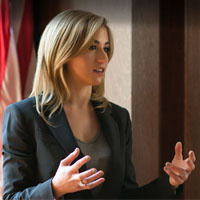Upper Darby Misdemeanor Lawyer, Pennsylvania
Sponsored Law Firm
-
 x
x

Click For More Info:
-
The Law Offices of Richard J. Fuschino Jr.
1600 Locust St Philadelphia, PA 19103» view mapCriminal Defense Protecting Your Freedom and Your Reputation
Richard J. Fuschino has been defending people against criminal charges for most of his professional career.
800-973-5371
Zak Taylor Goldstein
✓ VERIFIEDCriminal, Felony, Misdemeanor, DUI-DWI, White Collar Crime
Philadelphia Criminal Defense Attorney
Zak Goldstein is a Philadelphia criminal defense and civil rights attorney. Zak Goldstein has experience trying hundreds of cases before judges and ju... (more)
Lauren A Wimmer
✓ VERIFIEDCriminal, Police Misconduct, Felony, Misdemeanor, DUI-DWI
Philadelphia Criminal Defense Lawyer
Attorney Lauren A. Wimmer has represented individuals charged in both state and federal court with charges ranging from misdemeanors like drug and var... (more)
Arik T. Benari
DUI-DWI, White Collar Crime, Misdemeanor, Felony
Status: In Good Standing Licensed: 24 Years
FREE CONSULTATION
CONTACT Richard Fuschino Philadelphia, PA
Richard Fuschino Philadelphia, PA AboutThe Law Offices of Richard J. Fuschino Jr.
AboutThe Law Offices of Richard J. Fuschino Jr. Practice AreasExpertise
Practice AreasExpertise



